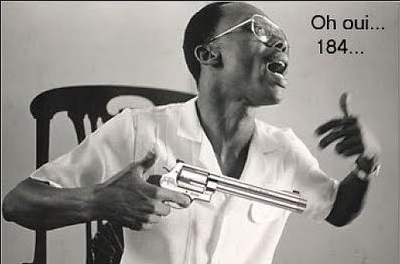Twelve jurors told a Miami federal judge on Friday afternoon that they were deadlocked in deciding the fate of a Haitian National Police officer standing trial on a drug-smuggling charge.
But a half hour later — after the judge urged them to find common ground — the jury reached a verdict: guilty.
The defendant, Claude Thelemaque, and his attorney, Albert Levin, were not only disappointed in the turn of events but stunned.
“We were completely shocked, given the fact they suggested in their note to the judge that they were a ‘hung jury,’” Levin said after the verdict was read.
Thelemaque, 47, now faces up to life in prison at his sentencing in early November before U.S. District Judge Kathleen Williams.
Thelemaque, a one-time police commander who was whisked away to Miami last November after his arrest at the U.S. Embassy in Port-au-Prince, was convicted of a single drug-trafficking conspiracy charge — the latest Haitian law enforcement officer to be taken down in a federal crackdown dating back more than a decade.
When Haiti flourished as a “narco-state,” Colombian cocaine smugglers would pay off local cops to protect their precious loads flown in on planes that landed at night on dirt roads illuminated by the headlights of police cruisers, according to U.S. authorities.
At the one-week trial, federal prosecutors portrayed the veteran Haitian National Police officer as a member of a protection racket that provided security for thousands of kilos of Colombian cocaine transported to the island between 2005 and 2012. Much of the white powder would eventually be smuggled into the United States, they said.
Assistant U.S. attorneys Monique Botero and Kurt Lunkenheimer said that Colombian and Haitian drug traffickers routinely hired the “best security” on the island — the Haitian National Police.
They said the Colombian traffickers knew Thelemaque by his alias, “Teleco,” as three of them testified against him at trial.
Prosecutors singled out a 420-kilo load of cocaine — about 925 pounds —that landed on a dirt road near the coast south of Port-au-Prince on Feb. 20, 2012, accusing Thelemaque of playing a key role on the security team. But Thelemaque’s defense attorney, Levin, countered that his client was not even in Haiti on that date. He showed the jury his client’s stamped passport to prove it.
Levin said that Thelemaque, who did not testify, was in Fort Lauderdale when the big cocaine load landed in Haiti and that he stayed in South Florida from Feb. 19-21 before returning to his country.
At trial, Levin confronted the three now-convicted traffickers, accusing them of misidentifying Thelemaque as “Teleco” in the hope of getting their prison sentences reduced.
One major convicted Haitian trafficker who cooperated with the Drug Enforcement Administration was Rodolphe Jaar. He tipped off U.S. authorities about the February 2012 cocaine load, while keeping some of the shipment for himself. Jaar, however, did not testify at Thelemaque’s trial — though he told DEA agents that Thelemaque had helped unload that cocaine shipment.
The 12-person jury noted his absence as a witness in a note to the judge, after starting their deliberations Wednesday afternoon.
The jurors said in another note late Friday afternoon that they could not reach a unanimous verdict, suggesting that Thelemaque’s defense attorney had raised enough reasonable doubt about his client’s security role in the cocaine-smuggling ring.
“We have exhausted all of our resources [and] are at a standstill,” the foreman’s note read. “Due to certain jurors [that] have their vehement beliefs and their opinions have not changed since the beginning of deliberation, we are a hung jury.”
But Williams, the judge, gave them a so-called Allen charge to finish their work, resulting in the unanimous guilty verdict for Thelemaque.
For years, Haitian cops have been accused of accepting bribes in exchange for protecting Colombian cocaine shipments, which arrived by plane and were then usually smuggled by boat into the United States.
Earlier this year, Haiti’s biggest cocaine kingpin, who had once accused former President Jean-Bertrand Aristide of accepting drug-related bribes, was released from a U.S. prison after helping prosecutors convict a dozen fellow traffickers, government officials and police officers in a long-running case that exposed Haiti as a “narco-state.”
Beaudouin “Jacques” Ketant saw his 27-year sentence chopped in half last April by a federal judge after the U.S. attorney’s office in Miami recommended that reduction because of his “substantial assistance” as a witness in other successful prosecutions.
Aristide, however, was never charged.

They should charge Aristide, Preval and now Martelly.
Haiti is now a real narco state.
Recently a big boat from Columbia with sugar carried some tons of cocaine that was moved from boat to a businessman warehouse. The boat is still seized and some say the cocaine was the largest in Haiti drug history. All is silence about this but could not happen without Martelly.